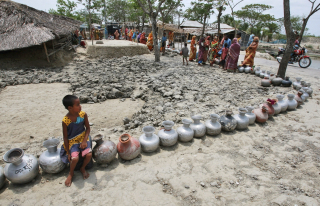Climate change is a theoretical problem to many, but not in Bangladesh. A single degree rise in temperature will increase sea levels by about a meter, enough to flood a fifth of Bangladesh and force nearly 30 million of its citizens to abandon their homes. If global temperatures continue to increase at their current pace, Bangladeshis will likely make up more than half of South Asia’s “climate migrants” by 2050, according to the World Bank.
It’s no accident, then, that Bangladesh Prime Minister Sheikh Hasina is a leading advocate of climate-change mitigation. At the United Nations General Assembly in September, she reiterated Bangladesh’s commitment to low carbon, climate-resilient development. She also called on other world leaders to join her in that campaign.
Bangladesh has pioneered some of the world’s cleverest and most meaningful approaches to energy conservation and reforestation, both of which reduce the carbon emissions that cause climate change. For example, Bangladesh now boasts the largest off-grid solar power program in the world. The Hasina government massively underwrote affordable, off-grid renewable energy production, including the installation of solar-home systems, generating electricity for more than 20 million people.
Read Full Article »




